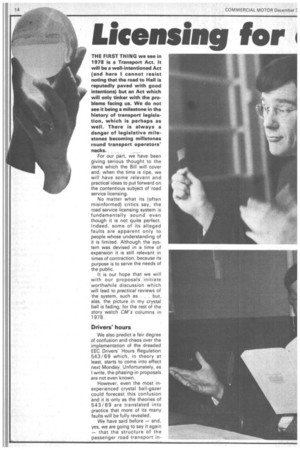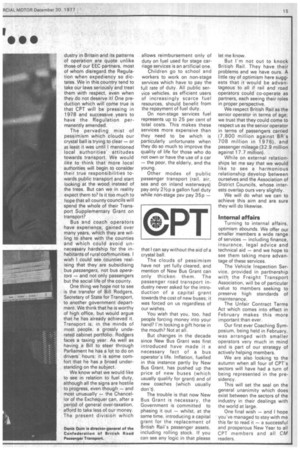Licensing for
Page 16

Page 17

If you've noticed an error in this article please click here to report it so we can fix it.
THE FIRST THING we see in 1978 is a Transport Act. It will be a well-intentioned Act (and here I cannot resist noting that the road to Hell is reputedly paved with good intentions) but an Act which will only tinker with the problems facing us. We do not see it being a milestone in the history of transport legislation, which is perhaps as well. There is always a danger of legislative milestones becoming millstones round transport operators' necks.
For our part, we have been giving serious thought to the items which the Bill will cover and, when the time is ripe, we will have some relevant and practical ideas to put forward on the contentious subject of road service licensing.
No matter what its (often misinformed) critics say, the road service licensing system is fundamentally sound even though it is not quite perfect. Indeed, some of its alleged faults are apparent only to people whose understanding of it is limited. Although the system was devised in a time of expansion it is still relevant in times of contraction, because its purpose is to serve the needs of the public.
It is our hope that we will with our proposals. initiate .worthwhile discussion which will lead to practical reviews of the system, such as . . . but, alas, the picture in my crystal ball is fading; for the rest of the story watch CM's columns in 1978.
Drivers' hours
We also predict a fair degree of confusion and chaos over the implementation of the dreaded EEC Drivers' Hours Regulation 543/69 which, in theory at least, starts to come into effect next Monday. Unfortunately, as I write, the phasing-in proposals are not even known.
However, even the most inexperienced crystal ball-gazer could forecast this confusion and it is only as the theories of 543/69 are translated into practice that more of its many faults will be fully revealed.
We have said before — and, yes, we are going to say it again — that the structure. of the passenger road transport in
dustry in Britain and its patterns of operation are quote unlike those of our EEC partners, most of whom disregard the Regulation when expediency so dictates. We in this country tend to take our laws seriously and treat them with respect, even when they do not deserve it! One preduction which will come true is that CPT will be pressing in 1978 and successive years to have the Regulation permanently amended.
The pervading mist of pessimism which clouds our crystal ball is trying to clear — or at least it was until I mentioned local authorities' attitudes towards transport. We would like to think that more local authorities will begin to consider their true responsibilities towards public transport and start looking at the wood instead of the trees. But can we in reality expect them to? Is it too much to hope that all county councils will spend the whole of their Transport Supplementary Grant on transport?
Bus and coach operators have experience, gained over many years, which they are willing to share with the counties and which could avoid unnecessary hardship for the inhabitants of rural communities. I wish I could see counties realising that they are subsidising bus passengers, not bus operators — and not only passengers but the social life of the county.
One thing we hope not to see is the transfer of Bill Rodgers, Secretary of State for Transport, to another government department. We think that he is worthy of high office, but would argue that he has already achieved it. Transport is, in the minds of most people, a grossly underated cabinet portfolio. Rodgers faces a taxing year. As well as having a Bill to steer through Parliament he has a lot to do on drivers' hours; it is some comfort that he has a broad understanding on the subject.
We know what we would like to see in relation to fuel duty, although all the signs are hostile to progress, even though — and most unusually — the Chancellor of the Exchequer can, after a period of general over-taxation, afford to take less of our money. The present division which allows reimbursement only of duty on fuel used for stage carriage services is an artificial one.
Children go to school and workers to work on non-stage services which have to pay the full rate of duty. All public service vehicles, as efficient users of increasingly scarce fuel resources, should benefit from the repayment of fuel duty.
On non-stage services fuel represents up to 25 per cent of total costs. This makes these services more expensive than they need to be which is particularly unfortunate when they do so much to improve the quality of life for those who do not own or have the use of a car — the poor, the elderly, and the young.
Other modes of public passenger transport (rail, air, sea and on inland waterways) pay only 21/2p a gallon fuel duty while non-stage psv pay 35p — that I can say without the aid of a crystal ball.
The clouds of pessimism have not yet fully cleared, and mention of New Bus Grant can only thicken them. The passenger road transport industry never asked for the introduction of a capital grant towards the cost of new buses; it was forced on us regardless of our wishes.
You wish that you, too, had people forcing money into your hand? I'm looking a gift horse in the mouth? Not at all.
But changes in the decade since New Bus Grant was first introduced have made it a necessary fact of a bus operator's life. Inflation, fuelled in this instance partly by New Bus Grant, has pushed up the price of new buses (which usually qualify for grant) and of new coaches (which usually don't).
The trouble is that now New Bus Grant is necessary, the Government is committed to phasing it out — whilst, at the same time, introducing a capital grant for the replacement of British Rail's passenger assets, including rolling stock. If you can see any logic in that please let me know.
But I'm not out to knock British Rail. They have their problems and we have ours_ A little ray of optimism here suggests that it would be advantageous to all if rail and road operators could co-operate as partners, each seeing their roles in proper perspective.
We respect British Rail as the senior operator in terms of age; we trust that they could come to respect us as the senior operator in terms of passengers carried (7,800 million against BR's 708 million in 1976), and passenger mileage (32.9 million against 17.7 million).
While on external relationships let me say that we would like to see a harmonious relationship develop between ourselves and the Association of District Councils, whose interests overlap ours very slightly.
We will do what we can to achieve this aim and are sure they will do likewise.
Internal affairs
Turning to internal affairs, optimism abounds We offer our smaller 'members a wide range of services — including finance, insurance, legal advice and technical aid — and we hope to see them taking more advantage of these services.
The Vehicle Inspection Service, provided in partnership with the Freight Transport Association, will be of particular value to members seeking to preserve high standards of maintenance.
The Unfair Contract Terms Act which comes into effect in February makes this -more important than ever.
Our first ever Coaching Symposium, being held in February, was arranged with smaller operators very much in mind and is part of our strategy of actively helping members.
We are also looking to the autumn when all four of CPT's sectors will have had a turn of being represented in the presidency.
This will set the seal on the general unanimity which does exist between the sectors of the industry in their dealings with the world at large.
One final wish — and I hope you've managed to stay with me this far to read it — a successful and prosperous New Year to all CPT members and all CM readers.




























































